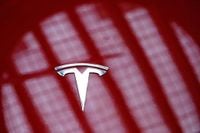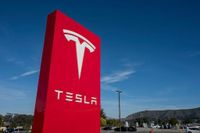Tesla Inc. officially opened its first showroom in India on Tuesday, July 15, 2025, marking a significant milestone for the American electric vehicle (EV) manufacturer as it enters the world’s third-largest automotive market. The showroom, dubbed an “Experience Center,” is located in the upscale Bandra-Kurla Complex business district of Mumbai. Spanning 4,000 square feet, the center showcases two variants of Tesla’s popular Model Y electric SUV: the rear-wheel drive (RWD) and the long-range RWD, both imported from the company’s Shanghai facility.
The Model Y RWD is priced at approximately 5.99 million rupees ($69,757), while the long-range RWD variant carries a price tag of 6.78 million rupees ($79,089). For comparison, the Model Y costs around $44,990 in the United States without federal tax credits. Tesla also offers a full self-driving option for an additional 600,000 rupees (about $7,000). Indian customers can place orders starting July 16, 2025, with a non-refundable deposit of 22,220 rupees (roughly $260) for registration in key cities including Delhi, Gurugram, and Mumbai. Deliveries of the RWD variant are expected to commence in the third quarter, while the long-range model is slated for the fourth quarter of this year.
Despite Tesla’s high-profile entry, the company’s pricing strategy places its vehicles beyond the reach of most Indian consumers. The luxury car market in India accounts for just about 1% of total vehicle sales, making Tesla’s offerings a niche product aimed at affluent, tech-savvy early adopters. Experts note that Tesla will primarily compete with established German luxury automakers such as BMW and Mercedes-Benz rather than local mass-market brands like Tata Motors or Mahindra & Mahindra.
“I won’t say that these prices are completely out of range because you will find buyers in India for all price points,” said Vivek Vaidya, global client leader for mobility at Frost & Sullivan. “The question is whether they are going to threaten the mass market. The answer to that is no because the most popular selling cars probably sell at one-tenth of this price.”
India’s EV market remains nascent, comprising just over 2% of total car sales in 2024. However, the government has ambitious plans to increase electric vehicle penetration to 30% by 2030, reflecting a broader push towards clean mobility and sustainable energy. Tesla’s arrival is seen as a boost to this vision, bringing world-class EV technology and potentially accelerating innovation within India’s growing EV ecosystem.
“With deeper local investments, Tesla can accelerate India’s EV ecosystem, drive innovation and support the government’s goal of higher EV penetration,” said Gaurav Vangaal, associate director with S&P Global Mobility.
The road to Tesla’s India debut has been long and complex. Elon Musk first teased plans to enter the Indian market in April 2016, inviting Indians to preorder the Model 3. Several customers placed orders and paid deposits, but the cars never arrived, and booking amounts were eventually refunded. Musk expressed frustration in 2019 on his social media platform X, highlighting that import taxes could double the price of Tesla vehicles in India, making them “unaffordable.”
India’s import duties on electric vehicles were as high as 100%, posing a significant barrier to Tesla’s entry. However, the landscape shifted after a February 2025 meeting between Indian Prime Minister Narendra Modi and Musk in the United States. Shortly afterward, India introduced a new policy reducing import taxes to 15% for EVs priced under $35,000, contingent on automakers committing to establishing manufacturing plants in India within three years.
Despite these incentives, Tesla has so far conveyed no immediate interest in setting up manufacturing facilities in India. In April 2025, Musk canceled a planned visit to India, citing “very heavy Tesla obligations,” and instead traveled to China. Tesla’s Chief Financial Officer Vaibhav Taneja has acknowledged the market’s potential but emphasized a cautious approach given the high tariffs and luxury taxes, which together can reach about 100%.
“The Mumbai showroom is a strategic ‘soft power’ move, not a full commitment,” said Diwakar Murugan, automotive analyst at Canalys. “Shifting a significant portion of its production to India would require a major re-evaluation of its global manufacturing strategy, something it’s not ready to do while its primary focus remains on scaling production in its established markets.” Murugan predicts Tesla may commit to full-scale manufacturing in India between 2028 and 2030, depending on incentives such as land subsidies, tax holidays, and the maturity of India’s local battery market.
Meanwhile, Tesla is expanding its presence beyond Mumbai. The company plans to open a second showroom in Delhi later this month and is preparing to establish a network of experience centers, service centers, delivery systems, charging stations, and logistics hubs across the country. Tesla has committed to installing four charging stations in both Mumbai and Delhi, including Supercharger posts and destination chargers, to support its customers.
India is the world’s fourth-largest automotive market after China, the United States, and Japan, producing nearly six million vehicles annually. However, its EV footprint remains modest, with two-wheelers dominating the segment. Tesla’s entry could inspire greater interest in electric SUVs, especially among luxury buyers.
In addition to automotive ambitions, Musk’s India plans include launching Starlink’s commercial internet services. The company recently secured regulatory clearances and is awaiting telecommunications airwaves from the Indian government, which may take several months. The rollout of Starlink could further underscore Tesla’s technological footprint in India.
Tesla’s global situation contrasts with its Indian debut. The company has faced declining sales in key markets, including China, Europe, and the U.S. In the second quarter of 2025, Tesla’s global deliveries dropped 13% to 443,956 units. Sales in Europe fell nearly 28% year-over-year in May, marking the fifth consecutive month of decline, while U.S. sales dropped 13% in the first half of the year. In China, Tesla’s deliveries declined 6.8%, as local competitors such as BYD gain market share.
Despite these challenges, Tesla’s entry into India represents a strategic expansion into a promising, if challenging, market. The company’s presence could catalyze India’s EV ecosystem, drive innovation, and align with the government’s clean energy goals. Yet, for now, Tesla’s high prices and lack of local manufacturing mean its vehicles will primarily serve a wealthy niche, rather than the broader Indian population.
As India continues to evolve its EV policies and trade negotiations with the United States progress, Tesla’s role in the market may grow. For now, the Mumbai showroom stands as a symbol of Tesla’s cautious but determined foray into one of the world’s most dynamic automotive landscapes.


